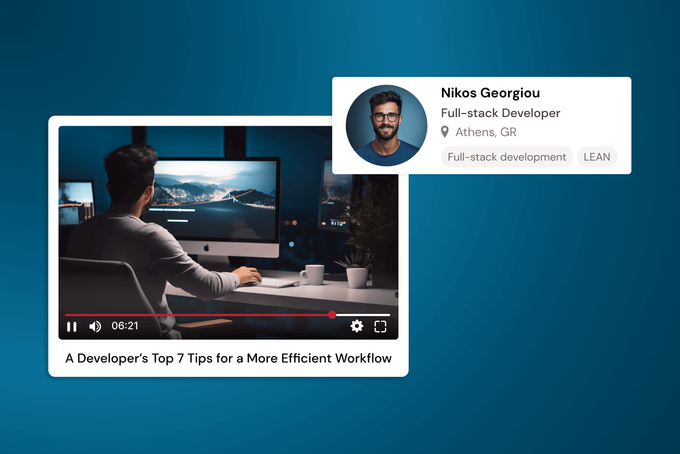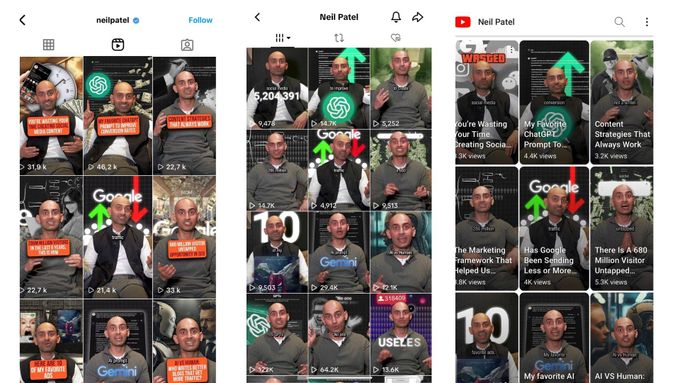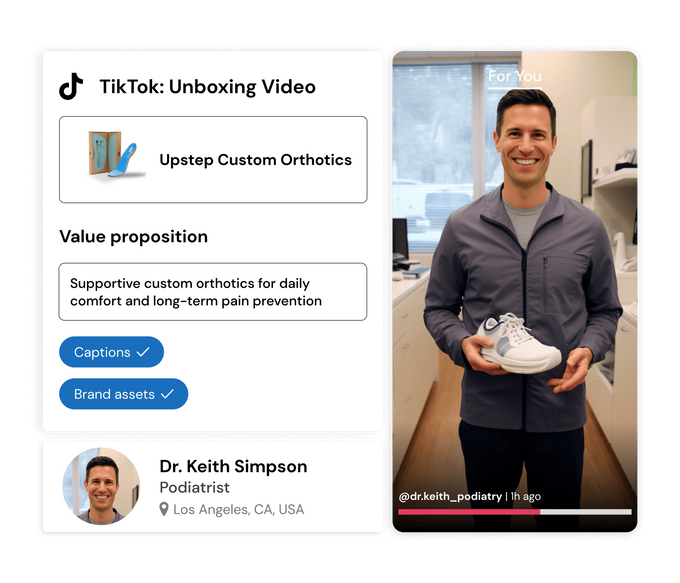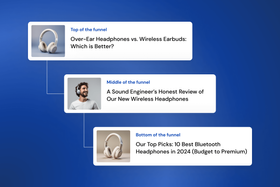Becoming the original source: How to create authentic, expert content
Harness unique expert perspectives to create authentic content with topical authority.
Updated March 18, 2024

AI Summary
According to a recent survey, 90% of consumers look to others' reviews and recommendations when deciding where to spend their money. As users place more trust in the opinions of subject-matter experts, influencers, and content creators, understanding the nuances of delivering unique personal perspectives is more important than ever.
In this guide, we'll take you through the challenges and core principles of successful content creation, provide insights into popular content types across platforms, and compare unique expert perspectives to alternative content creation methods.
What's in this guide
- Common challenges of content creation
- 3 core principles of successful content
- Content types to consider across platforms
- Expert perspectives vs. other content
Common challenges of content creation
Modern content creation has taken several twists and turns. Knowing the potential challenges before you embark on your own content journey can help you better prepare.
The rise of generative AI technologies
Over the last few years, there has been a massive uptick in the use of generative AI tools for diverse content-generation purposes. While this proliferation opens avenues for creativity, it raises concerns about content accuracy, quality, and originality. As AI models become adept at generating generic content, the true value of human creators lies in their ability to offer unique perspectives, personal experiences, and subject matter expertise.
An influx of competition online
AI tools have led to a surge of online content, given that now nearly anyone can create large amounts of content at virtually no cost.
With a daily increase in the average number of posts published online, competition for visibility and engagement has intensified significantly. Brands might need to overcompensate to ensure they stand out online.
A major attention shift towards social media
Content is king, and socials are the kingdom. This shift necessitates a different approach to content creation strategies. You want to create authentic, user-generated content (UGC) that resonates with your audiences without overspending. The demand for video content, particularly short-form videos, has skyrocketed, driven by platforms like TikTok.
Marketing guru Neil Patel pushes short-form video content over long-form and distributes his content across multiple social channels for maximum reach and discoverability.
» Are you an expert? You can monetize your expertise with social media videos.
3 core principles of successful content
Now that you have the challenges in mind, you need to know what successful content looks like. Let's examine the core principles you must understand to craft a successful content strategy.
1. Provide expert perspectives
People want unique experiences, fresh perspectives, and subject-matter expertise. Informed opinions and personal experiences resonate deeply with audiences and can lead to an increased conversion rate.
Establishing yourself as an authentic source means delivering informative and genuinely unique content that provides real value. As AI becomes a part of content creation, the challenge lies in crafting content that stands out and showcases human expertise and perspectives.
» Find out why you should choose experts over writers.
2. Share new information beyond entertainment
In such a saturated market, simply regurgitating information from other sources or creating content with AI poses a major risk. You want to ensure your brand is perceived as the original source of information.
You need fresh insights, opinions, tips, and best practices that offer more to your audience than mere entertainment value. Focus on delivering unique and valuable information to sustain your audience's interest and loyalty.
3. Optimize your content for each platform
Authenticity alone is not enough–your content must also align with the preferred format and consumption patterns of your target platform. Each social media channel has its own native content formats that resonate best with its user base. For instance, short-form videos tend to perform well on TikTok and Instagram, but visually rich imagery thrives on Pinterest where users are actively seeking inspiration across various interests.
While your content can be repurposed across multiple platforms, tailoring it to each platform's audience is important. This ensures your messaging cuts through the noise and drives engagement.
Content types to consider across platforms
Because AI can provide direct answers to complex queries, the way people search for and consume information is changing. Brands should differentiate between content that AI can generate well (factual information, how-tos) and content that requires human expertise and perspectives. The latter is critical for creating content that resonates deeply with audiences.
Google's EEAT (Experience, Expertise, Authoritativeness, and Trustworthiness) principles provide guidance–Google is prioritizing content with unique perspectives and subject matter expertise over generic content.
Let's take a closer look at which content formats are best for building a brand identity that counts and improving SEO.
Content formats for social media videos
While there is certainly space for written content, video is currently dominating the social media and marketing landscapes.
- Interviews: Conversational video content featuring discussions with experts, influencers, or industry leaders.
- Tutorials: Video guides demonstrating product usage or providing educational content in an engaging format.
- Product reviews: Virtual assessments of products, providing a first-hand look and influencing potential buyers.
- Product demos: Showcase product features and functionalities to enhance understanding and appeal.
- Shorts/reels: Bite-sized, engaging videos tailored for short attention spans, often incorporating trends and challenges.
- Unboxing videos: Consumers share their excitement by showcasing the unboxing experience of products, building anticipation and trust.
- Podcasts: Short clips from podcast episodes, offering an additional layer of engagement.
Content formats for SEO
- Landing pages: Targeted pages to convert visitors into customers, often associated with specific marketing objectives.
- Category pages: Optimized pages categorizing products for efficient navigation and improved search engine ranking.
- Articles: Detailed content for various topics, aiming to provide value and attract organic traffic.
- Thought leadership content: Sharing expert opinions and perspectives in content to establish authority.
- Reviews and comparisons: Detailed evaluations of products or services that influence users' purchase decisions.
- Alternatives: Showcasing alternative solutions to help users explore options.
- Top 10 pages: Lists highlighting top products or services within your niche to improve visibility.
- Tutorials: Step-by-step guides demonstrating how to use your products or perform certain tasks related to your niche.
- FAQs: Addressing common questions to build topical authority and improve search visibility.
- Community forums: Spaces for open discussion, fostering community trust, and audience engagement.
» Take advantage of the types of content still relevant in the age of AI.
Expert perspectives vs. other content
Unique expert perspectives
Getting insights from subject matter experts can provide valuable authenticity and unique perspectives that truly resonate with your audience. Content created using expert sources stands apart in its genuineness and ability to build trust. While finding the right experts can be challenging, the high quality and versatility of expert-generated content make it well worth the effort if executed strategically.
Pros
- Real, authentic content
- Fresh perspectives and expert opinions
- Diverse applications
- Highly scalable
Cons
- Sourcing may be difficult
Health platform InsideTracker collaborates with experts using Entail's expert marketplace to deliver vetted and up-to-date content to their customers.
User-generated content
UGC is often more genuine and provides an unfiltered look into user experience and perception. While it works well with audiences looking to validate their purchase decisions, UGC is mostly product-focused, so the scope for diverse content is limited.
Pros
- Authentic, trustworthy format
Cons
- Limited application
- Content diversity is limited
Activewear brand Lululemon often uses UGC to promote their products on their social channels.
Actor-generated content
Actors provide flexibility to produce video or written content about products in diverse scenarios. However, staged content generally lacks the authenticity that forges meaningful connections with audiences.
Pros
- Offers more flexibility in content creation
Cons
- May erode trust and alienate audiences
- Lacks authenticity
L'Oréal Paris uses actors in their videos to promote their products. While their videos are high quality and engaging, users may be less likely to trust what they say, even if they're celebrities.
AI-generated content
While AI-generated content might successfully imitate human writing, it often lacks in-depth insights. Using AI to create content means risking quality and credibility.
Pros
- Fast and cost-effective
Cons
- Often lacks depth and authenticity
- Risks inaccuracies and credibility concerns
This TikTok video demonstrates how unique and engaging AI-generated video can be. But when it comes to creating content for your service or product, you need to put measures in place to ensure that the message and quality remain true to your brand identity.
Homegrown content
Creating content in-house aligns well with your brand voice and messaging, but pouring already strained internal resources into content development often leads to mediocre, inefficient output.
Pros
- Fits your brand's voice, values, and messaging
Cons
- Resource-intensive
- Often executed inefficiently
Hubspot is able to create high-quality video content in-house, but most businesses lack the ability to pull this off effectively.
Agency content
Agencies provide efficient processes for scaling content production. However, the bureaucracy and excessive procedural approval requirements lead to slowly-produced, generic content that lacks authenticity despite high costs.
Pros
- Handle large-scale content production efficiently
Cons
- Requires high level of involvement
- Slow delivery
- Expensive, yet generic
Influencer content
Influencers build trust and credibility with engaged followers in their niche, which allows them to organically influence audience opinions and perceptions. However, scaling influencer content requires managing relationships with many creators and negotiating cost-effective partnerships. There is also the risk that influencers dilute your brand messaging.
Pros
- Trusted by audiences
Cons
- Brand often takes a backseat
- Expensive to scale
Kylie Cosmetics often features influencers and content creators on their social channels to help launch new items.
» Want to share your expertise and build your personal brand? Become a creator.
Establish your brand as an authority with expert content
The resounding verdict is clear: unique expert perspectives are indispensable as AI transforms content creation. Enter Entail AI's expert marketplace, a pioneering solution that seamlessly connects businesses with real subject-matter experts and content creators within their industry.
Our platform facilitates the creation of authentic, expert-enriched content at scale, offering a cost-effective solution to help businesses bridge the gap and overcome the common challenges faced within the content industry.
Amplify your brand's voice and forge lasting connections with your audience through the power of unique expert perspectives in partnership with Entail AI.
FAQs
Why is unique expert perspective crucial in content creation?
Unique expert perspectives create an authentic connection with audiences, fostering trust and credibility. They set brands apart, offering valuable, unique content that resonates deeply with modern consumers.
Why is optimizing content for each platform's native format crucial for engagement?
Recognizing and adapting to different native formats across platforms is essential for optimal engagement and resonance with diverse audiences.
How do you balance the need for scalability with maintaining authenticity in content creation?
Consider the variety of content types and platforms available to you. Each type of content has its own pros and cons. These need to be weighed against your goals.






